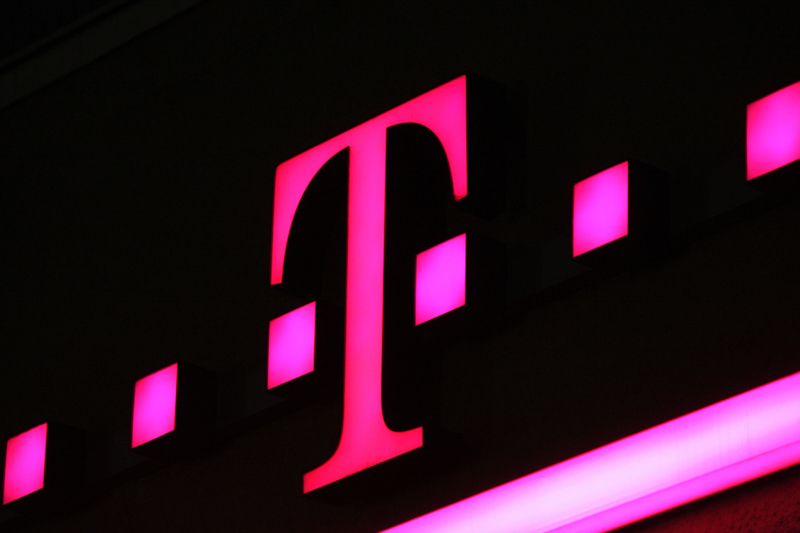By Harro Ten Wolde
FRANKFURT (Reuters) - Deutsche Telekom (DE:DTEGn) rejected an offer from Iliad (PA:ILD) for its mobile business in the United States and said regulators there should help smaller players compete against bigger rivals if they are not allowed to merge.
Deutsche Telekom makes about a third of its sales and a fifth of core profits in the United States, but believes its subsidiary T-Mobile US lacks critical mass, frequencies and capital to compete with leaders AT&T (N:T) and Verizon (N:VZ).
Its plan to sell T-Mobile US (N:TMUS) to local rival Sprint (N:S) foundered on Wednesday, leaving Iliad - a much smaller French company with little experience of U.S. telecoms - as the remaining bidder although others could still emerge.
Deutsche Telekom's Chief Executive Tim Hoettges made it clear that Iliad's $15 billion (8.90 billion pounds) offer was not good enough and there was no need to rush into a sale, while leaving the door open to an eventual U.S. exit.
"We have always said that we would be open to offers for T-Mobile US which would improve its position and that of its shareholders," he said on a conference call on Thursday. "At the moment, we don't have an offer which fits those criteria."
The Sprint talks collapsed because a deal would have left the United States with only three major mobile phone networks, a prospect opposed by regulators in Washington. It was the second failed attempt to sell T-Mobile US since late 2011.
Iliad's billionnaire founder Xavier Niel believes he can secure a deal where Sprint failed because a takeover would not lead to fewer competing U.S. mobile networks.
A person close to Iliad said on Thursday that it would weigh whether to improve its $33 per share bid for 56.6 percent of T-Mobile US, but that it first wanted to talk to the German company to learn more about its expectations.
Much would depend on whether another bidder emerges, the person said, and whether Iliad can convince Deutsche Telekom of its ability to run T-Mobile in a more cost efficient way.
Deutsche Telekom shares fell as much as 5 percent to a 16-week low on Wednesday after the Sprint talks collapsed. They were trading down 0.6 percent by 1355 GMT on Thursday, in line with an index of European telecoms companies <.SXKP>.
T-Mobile US shares were down 0.8 percent, while Iliad stock in Paris was down 1.8 percent.
NEW SUITORS
After years of losses and a purchase of smaller rival MetroPCS, T-Mobile has become one of few parts of Deutsche Telekom that is actually growing.
T-Mobile, the fourth-biggest U.S. mobile network operator, last week reported its first quarterly net profit in a year, raised its forecasts for subscriber growth and reported the most post-paid phone subscriber additions in the industry.
Other suitors could emerge. The chairman of the second-largest U.S. satellite operator, Dish Network Corp (O:DISH), said on Wednesday it now made sense to consider bidding for T-Mobile US, with Sprint out of the picture.
But a buyer will need deep pockets.
Analysts estimate that T-Mobile US will need anywhere from $5 to $10 billion to bid for the best spectrum in an auction next year, and further billions to keep upgrading its network to keep up with consumer demand for quality and speed.
Hoettges is expected to lobby regulators for better conditions in the auction, including setting aside low-frequency spectrum for T-Mobile and on Thursday he said his company would need special treatment.
"In the U.S. we have the situation that the two largest operators take more than 100 percent of the cash flow in the market," he said. "If consolidation is not desired, regulators should help to improve the position of smaller operators."
But he also talked up T-Mobile US's commercial momentum.
"We have an excellent business in the U.S. which is growing organically," Hoettges said. "At the moment we received no offer (for T-Mobile US) which gives better growth perspectives than we currently have."
A rise in earnings in the United States helped Telekom reported a bigger than expected second-quarter core profit on Thursday, offsetting heavy investments in its German networks.
The strong U.S. performance helped Europe's largest telecoms company by sales avoid larger revenue declines suffered by rivals Telefonica (M:TEF) and Orange (PA:ORAN).
U.S. PRICE WAR?
Deutsche Telekom's quarterly earnings before interest, tax, depreciation and amortisation (EBITDA) excluding special items rose to 4.43 billion euros ($5.9 billion), above the average forecast of 4.35 billion euros in a Reuters poll.
With 50.5 million customers, T-Mobile US is bigger than Deutsche Telekom's German business which has 39.3 million. Average revenue per user (ARPU) stood at 26 euros a month in the quarter, compared to 14 euros in Germany.
Deutsche Telekom's desire to leave the U.S. stems in part from a realisation that it must invest heavily in faster fibre broadband in its domestic market or continue losing customers to cable. Hoettges also wants the group, which is 31 percent owned by the German state, to take part in consolidation in Europe.
The global telecoms industry is in the midst of a wave of dealmaking as companies look to take advantage of low interest rates to build economies of scale.

Investors fear the end of talks with Sprint could mean a price war could be imminent in an almost saturated U.S. market. Sprint also named a new CEO to pilot a solo strategy.
(Additional reporting by Leila Abboud; editing by Tom Pfeiffer)
